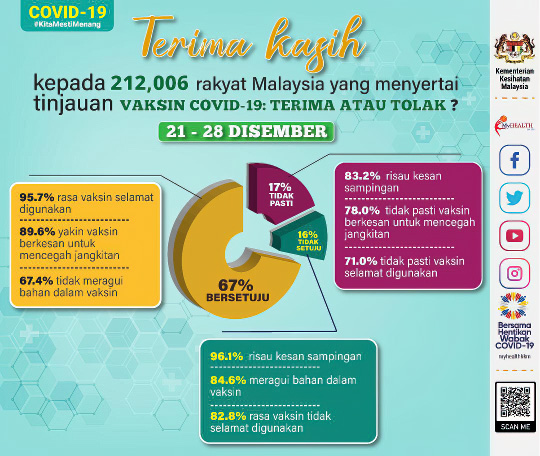Despite having secured sufficient Covid-19 vaccine sources to immunise Malaysia’s entire adult population, the government may still face serious challenges ahead in its goal of achieving herd immunity against the disease.
In a survey conducted by the Health Ministry, only 67 percent of respondents indicated that they would agree to receive the vaccine.
This is just short of the government’s goal of immunising 70 percent of the entire population, which is thought to be sufficient to slow the spread of Covid-19 and protect even those who have not been vaccinated.
Another 17 percent of respondents indicated they are unsure, and 16 percent said they would reject the vaccine.
In a Facebook post last night, Health Ministry director-general Dr Noor Hisham Abdullah congratulated those who have expressed willingness to receive the vaccine.
“However, there are some respondents who are unsure or disagree with receiving the Covid-19 vaccine.
“The Health Ministry understands the concerns and worries surrounding the safety, efficacy, and side effects of Covid-19 vaccines, and would take necessary steps including to channel accurate and transparent information,” he said.
The survey was conducted online from Dec 21 to Dec 28 and received a total of 212,006 responses.
However, no demographic data, such as the age of the respondents, was published.
For the record, the herd immunity target of 70 percent refers to Malaysia’s entire population, of which those below 18 years old would make up a significant portion of the unvaccinated.
This is because the current crop of Covid-19 vaccines has yet to be tested on that age group, or is just beginning to be tested. Thus the government would not recommend Covid-19 vaccination for non-adults.
Meanwhile, the leading reasons cited by those who hesitate or refuse to receive the vaccine are concerns regarding side effects (Unsure: 83.2 percent; Refuse: 96.1 percent).
Among those who refuse, other top reasons include doubts regarding vaccine ingredients (84.6 percent) and concerns that the vaccines are unsafe (82.8 percent).
As for those who are unsure, 78.0 percent said they are unsure of the vaccines’ efficacy, and 71.0 percent said they are unsure whether the vaccines are safe.
Meanwhile, 95.7 percent of those who are willing to be vaccinated said they felt the vaccines are safe, and 89.6 percent expressed confidence that it would prevent infection.
Nevertheless, only 67.4 percent of those willing to receive the vaccine said they have no reservations regarding the vaccines’ ingredients.

Previously, Special Vaccine Supply Access Guarantee Committee (JKJAV) co-chairperson Khairy Jamaluddin said Malaysia is booking enough vaccines for 82.2 percent of the country, with the option to add another 20 percent coverage from Pfizer if some vendors fail to deliver.
Thus far, Malaysia has signed vaccine purchase agreements with Pfizer, AstraZeneca, and the Covid-19 Vaccines Global Access Facility (Covax).
These would be sufficient to cover 40 percent of Malaysia’s population, with the first deliveries expected in February this year.
In addition to these, Malaysia is in the final stages of negotiations with Sinovac, CanSion Biologics, and the Gamaleya Institute to purchase their vaccine candidates. Talks are also ongoing with Moderna and Johnson & Johnson.
These agreements are contingent on the National Pharmaceutical Regulatory Agency’s approval, which would assess the vaccine candidates for its quality control, safety, and efficacy.
Malaysia plans to immunise its citizens free-of-charge, but would not make it compulsory. - Mkini




No comments:
Post a Comment
Note: Only a member of this blog may post a comment.